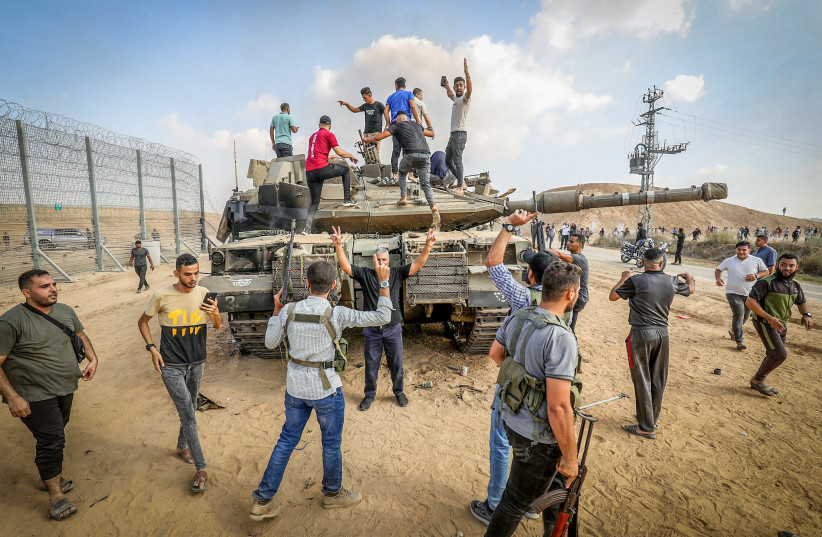Last week, we all had something to celebrate: our decisive victory over Iran. And next week, we will all have something else to celebrate: Passover, the Festival of Freedom.
Right now, however, many of us don’t feel like celebrating – and that’s OK.
When the impressive Israeli Air Force, along with our allies, neutralized 99% of the all-out missile and drone attack launched against us by the blood-thirsty Islamic Republic Guard Corps (IRGC), we didn’t let the victory go to our heads.
We didn’t go out onto the streets whooping with joy, toting machine guns, and handing out sweets, as our enemies would have done. Instead, we afforded ourselves a wry smile and maybe took to social media to express our pride in the Air Force and relief that, aside from one young girl who, very sadly, was hit by shrapnel, no one was injured – before quietly and confidently carrying on with our lives.
Unable to forget the tragedy of October 7
How can we celebrate when the death and destruction of October 7 are still so fresh in our minds? How can we celebrate when we’re still embroiled in a bloody war that has already seen hundreds of soldiers lose their lives and thousands more suffer life-changing injuries?

How can we celebrate when the North of the country is still coming under heavy rocket barrages on a daily basis and over 100,000 people have lost their homes and are now living as refugees in their own country?
How can we celebrate when over 130 hostages remain in captivity in Gaza, some of whom have, reportedly, been murdered there?
These are just some of the questions with which I’ve been wrestling since October 7, whenever something that normally would have sent me to the nearest pub for a few festive drinks, now leaves me cold.
ANOTHER SPECIFIC issue that has been plaguing me of late is Passover. How can we celebrate the festival of freedom, now, when so many of our brothers and sisters are being held in captivity? How can we carry on as normal in the face of this tragedy?
Would it be best simply to abandon Passover altogether this year, as some have indicated they will?
While we may not choose to “celebrate” Passover, we must honor and observe it, perhaps in a way that marks it out from other years, by, for example, leaving an empty chair at the Seder table and saying a Passover prayer for the release of the hostages as Chief Rabbi David Lau suggested.
If we don’t, we are in danger of allowing the evil forces of Hamas, Hezbollah, and their supporters to come between us and our precious heritage. If we let the holiday pass without marking it in some way, we are forsaking both our ancestors who fought so hard and sacrificed so much for our freedom, and future generations who rely on us to keep the line of continuity strong.
Furthermore, we owe it to the victims of the Hamas attack and to the soldiers – some of whom made the ultimate sacrifice to keep us safe – to mark this festival in not only a traditional way but also a meaningful one.
We must remember them and celebrate their courage and bravery as we sit around the Seder table, reciting the Passover story.
And finally, and most importantly, we owe it to the hostages who remain in captivity to dedicate this holiday to each and every one of them, so that they are not forgotten.
This year, the festival of freedom should serve as a reminder of those who are fighting for theirs – and their loved ones who will not rest until they are home.
No matter how successful we are as a nation and in our personal lives, we cannot rest or feel unbridled joy until every single hostage is free. Not “celebrating” the wins, however large or small doesn’t mean our enemies have won or that they’ve broken our spirit. On the contrary; it means that we are a strong nation that stands as one.
Until all of the captives have been freed, we must hold them in our hearts and minds, especially during Passover, the festival of freedom.
The writer is a former lawyer from the UK who now lives and works in Israel as a freelance writer for The Jerusalem Post.
